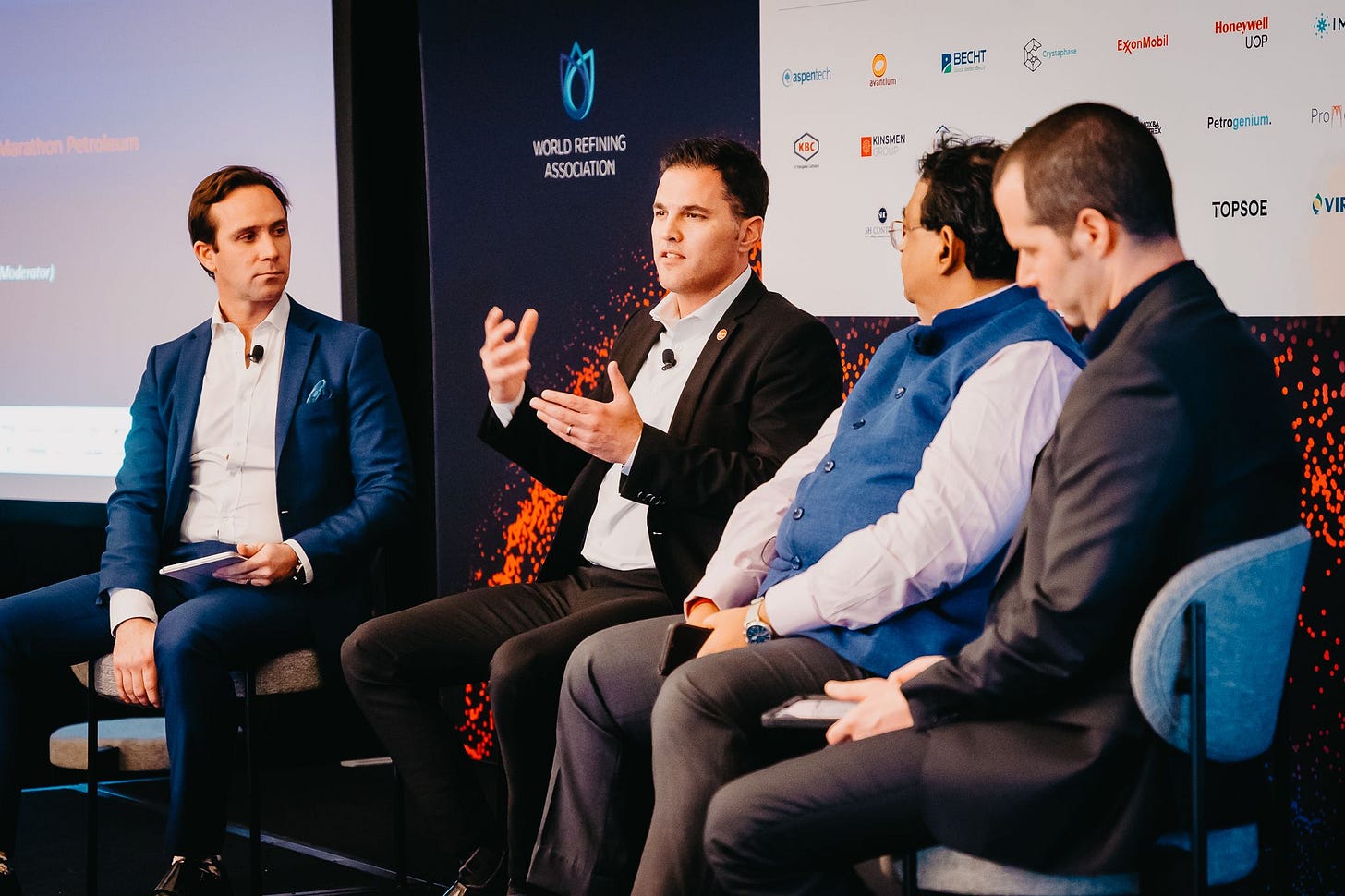Conference Recap: NARTC
Getting the lowdown on all things digital transformation and energy transition for the North American refining industry
TL;DR:
Pontem moderated the closing panel session of the conference with a focus on process and change management for digital technologies in the refining industry
Most of the panel sessions focussed on the repurposing and modifications needed to produce alternative fuels such as ethanol, bio-diesel and sustainable aviation fuel and the changing demand for these products as the world transitions to a lower carbon footprint
Most of the technical presentations focussed on the new technologies and processes for low-carbon fuels and the use of digital technologies
Most of the conversations focussed on ongoing operational efficiencies and pragmatic incorporation of digital tools to increase production and reduce cost
The phrase of the conference was “Carbon Intensity”… the key metric for any project/product
A clear program for digital transformation and technical change management is needed to accelerate adoption in this historically conservative industry
A fresh take for North America
The World Refining Association has staged some excellent events in the past with high profile events for refining technology in Europe and Latin America spread over many days with multi-stream events and activities for participants. WRA is hoping to build the North American Refining Technology Conference (NARTC), held over 2 days in late January, up to a similar scale in the coming years after first staging the event in 2022. Based on the attendance and discussion at this year’s conference they are well on the way to establishing NARTC as a key event in the calendar for refiners and technology providers.
The two key themes for the event were energy transition and digital adoption. At Pontem we see a massive opportunity to embed some innovative data driven technologies into the refining space, including pragmatic ML modeling and deep reinforcement learning, however this digital transformation will need support to ensure it is well adopted. In recognition of our expertise in digital transformation, I was asked to moderate the panel on Process and Change Management as the last session of the conference… just before heading off to Breckenridge for a few days snowboarding.
Before getting into that, however, let’s address the elephant in the room…how can US refiners tackle energy transition?
Fuels of the Future
The main theme of the conference was energy transition and the fuels, processes and products required to make this transition possible. The stage was set early with a couple of keynotes and panels squarely focussed on the changing demand for traditional fuels and products and the opportunities to pivot the industry to meet this demand.
It was clear from the discussions that while the US has an incredible installed base of existing refining capacity, there is a lot of work to be done to shift the mindset and the process over to low carbon fuels such as bio-diesel, ethanol and sustainable aviation fuel (SAF). Co-processing was discussed quite a bit and it seems like many refiners are modifying their assets to process alternative feedstocks and gradually transition to low carbon fuels through this route.
However, the supply chain impacts of this transition are not straightforward. In changing feedstocks and providing additional products there is a significant transition in the overall supply chain which is still not well understood. The same goes for hydrogen which many refiners are utilizing as part of their process and understanding when to deliver it as a product and when to use it as a lower carbon fuel source.
The technologies needed to support this transition are continuing to be developed however the parameter space for all the different feedstock and product vectors is so broad that the optimal path is still very unclear.
Keith Couch from UOP presented a comprehensive overview of the tradeoffs between hydrogen production/usage and alternative products in the global marketplace with various factors influencing the dynamic in each region. Was it enlightening? Very much so. Are there lots of variables still to be determined? Most definitely.
The digital journey is not a straight path
While low carbon fuels dominated much of the conversation on day 1, digital technologies took center stage on day 2. After some robust discussions at the roundtable discussions the previous day there was broad consensus from the panelists in the morning panel on Digital Transformation that the industry still has a way to go. Much of the conversation centered on the demonstration and measurement of value for refining businesses as opposed to the efficacy of various digital technologies available. The general consensus was an awareness of the potential but with a long-term uphill battle to overcome the conservative inertia in the organizations.
The fundamental challenges raised during this discussion indicate the need for a clear process to help clients along this journey of very clearly understanding their business objectives and prioritizing initiatives to deliver value. Pontem has developed a clear framework for delivering this strategic digital plan based on years of experience delivering digital transformation initiatives across the globe and seeing the success (or failure) of programs which don’t address the key value drivers and don’t provide a suitable roadmap for implementation. A snap shot of that framework is presented below:
One key aspect raised was the need to deliver short term benefits to prove the early value of initiatives whilst also progressing along the path of broader transformation to provide lasting and wide scale change. The strategy of how digital initiatives are introduced and embedded into an organization, from the ops room to the board room, was the topic of the final panel of the day: “Process & Change Management Panel: Challenging The Skepticism On Digitalization & Cultivating An Aligned Culture Of Change & Operational Excellence”.
I was happy to moderate this panel as I’ve developed a real passion for technical communication and change management process related to digital transformation and organization change. In talking with executives on the reasons for success and failure of programs the key differentiator was appropriate change management.
I was joined onstage with several industry leaders:
Ido Biger, Chief Technology & Data Officer, Delek US
Dipankar Das, Group Vice President & Head of Digital & IT, Marathon Petroleum
Gil Cohen, CEO & Co-founder, Imubit
We had a great and wide ranging discussion reflecting on the topics raised in previous sessions which all touched on the change management journey all companies are on to achieve the digital and energy transformation goals. Dipanker from Marathon Oil has a wealth of experience in both operations and consulting and was able to articulate the balance between incremental improvement and enterprise transformation, and gave some excellent insights into how overall corporate strategy can be adopted throughout an organization to drive lasting change.
Ido from Delek offered a great view based on his eclectic career with experience in banking, airlines and the energy industry. He advocated the need to expand the vision to more readily adopt proven approaches and technologies from other industries and ensure business processes are well established to benefit from any technology adoption. Gil from technology provider Imubit, provided excellent content on tempering the AI hype whilst overcoming resistance to change in this conservative industry. His comments around the need for domain expertise to drive technical change with the right digital tools matches perfectly with Pontem’s mission to bridge the gap between data and discipline.
With the conference wrapped up in excellent fashion, and with some very valuable conversations along the way, Pontem is well placed to continue our expansion in the refining industry. There are a lot of changes needed to capitalize on energy transition and digital transformation drivers and we are primed to support the industry in these areas.
With the parting words of the conference, I scooted out of the Four Seasons, grabbed my fur coat and rushed off to the airport to catch the last plane of the day to Denver for a long weekend of snowboarding with good mates in Breckenridge. It was a quick change but with the right planning and strategy anything is possible!








